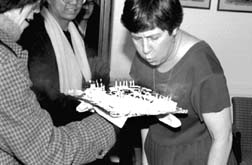








The delivery of a white cake reading "Happy 25th Anniversary: No More Silence" to President Nancy Dye in late November initiated this year's student pressure for inclusion of Asian-American Studies in the college curriculum.
The delivery of the cake was followed by a speak-out which drew over 100 people at its peak despite the bitter cold.

Due to this student protest, as well as growing concern among faculty that Asian-American issues be included in the curriculum, the college made several hiring and curricular changes.
Christine Ham, a sophomore and member of the Asian-America Studies Committee and the Asian American Curricular Task Force, said at the speak-out that the lack of an Asian American Studies department "doesn't just affect Asian-Americans. It affects the reputation and curriculum of the school."
A surprise for Dye: Students asking for an Asian-American studies department greeted President Dye in December with a cake commemorating the 25th year of student pressure for the department. (photo by Alex Warnow)
Students also pointed out that the issue has been one of concern for 25 years. Senior Vince Schleitwiler said at the speak-out, "Every time we raise this issue it's like it's for the first time."
At the speak-out students read titles of various Experimental College courses, Winter Term projects, private readings and academic papers with an Asian-American focus that students have been involved with since 1970.
Despite the efforts of students, former Dean of the College of Arts and Sciences Mary Ella Feinleib said in December that she did not see the implementation of an Asian-American Studies Department in the short term. Many in the college are instead focusing on integrating the area into the current department structure.
Efforts to integrate Asian-American issues into the curriculum include the appointments of two one-year positions in the history and sociology departments. Both appointees are experts in Asian-American studies and plan to teach courses focusing on Asian-American issues. Currently the only faculty-taught class that specifically addresses Asian-American issues is a history course offered in alternate years. Dye called the appointments "experimental," and said that through them the college hopes to "spark the possibility" of greater inclusion.
With the support of the Asian American Curricular Task Force, Linda Trinh Vo was appointed to replace two sociology professors on leave next year. The history department appointed Benson Tong to teach classes in Asian-American history, Native American history and gay and lesbian history.
In addition to those appointments, Sylvia Watanabe has been hired as a temporary replacement in the Creative Writing department. Watanabe was approved for tenure track this year as well. Watanabe writes about multi-ethnic issues in her native Hawaii.
"I'm glad [about the appointments], but they are temporary, and there is no guarantee of permanence by the college," said Ham in May.
Much of the discontent with the current status of Asian-American studies arises from the perceived contradiction between the college's emphasis on ethnic and cultural diversity but the lack of an Asian-American studies department. "Oberlin is supposed to be a liberal and progressive institution - so I came here. We all fell for it," college senior Ji Young Um said at a speak-out held in late November.
Dye said that she and the college are deeply dedicated to a diverse curriculum. She stressed the idea of curriculum integration. "You really let other departments off the hook if you deal with Asian-American issues as its own department," Dye said. She pointed out that almost all departments need to include Asian-American issues in their current curriculums.
Dye said that she foresees a continued emphasis on building a strong Asian-American curriculum next year.

Copyright © 1996, The Oberlin Review.
Volume 124, Number 25; May 24, 1996
Contact Review webmaster with suggestions or comments at ocreview@www.oberlin.edu.
Contact Review editorial staff at oreview@oberlin.edu.